God is like the number zero

If the mysterious workings of the universe can be explained using math then could it also be possible to somehow explain the existence of God using only numbers?
I’ve come to the realization through my experience programming, some strange error messages, and from my experience reading the bible that the answer may actually be, yes.
“I am Alpha and Omega, the First and the Last, the Beginning and the End.”
- Revelation 22:13
Division by zero
If you’ve ever tried to build an app then you might have come across an error referred to as a division by zero error. You can also just try dividing any number by zero on your calculator and it will tell you an error has occurred. This error is what initially sparked my interest. I thought, how could such a simple mathematical equation result in an error?
I soon realized that both the calculator and computer were giving an incorrect answer to these types of equations. It may even be the case that this has been done purposely or it might just be human error. Whatever the case, someone had to program these types of calculations to return an error message.
The main reason for this so-called error is because if you allow a calculator or computer to process this equation it would essentially become stuck in a loop. This equation would literally take forever to solve, so in reality this error is actually just an endless loop or to put it another way, infinity.
1 ÷ 0 = ∞, 2÷ 0 = ∞, 3 ÷ 0 = ∞, …
Lets also think about what division really is for a minute. It’s really just a fancy way of saying how many times can we subtract any given number from another number until we reach zero. If we never subtract anything over and over then we would do this an infinite amount of times never reaching zero, and thus the answer becomes clear.
Division by infinity
The realization that the answer to the division by zero error was actually infinity is what got me thinking even further. What would happen if you tried to divide a number by infinity?
So I tried doing this calculation as well, and I was surprised by the result because I was expecting to get another error message. However, I got the number zero instead.
1 ÷ ∞ = 0, 2 ÷ ∞ = 0, 3 ÷ ∞ = 0, …
Why would another infinity equation not result in another error message? This only further reinforced the idea that division by zero was not really an error, even though every calculator and every computer ever made would tell you otherwise.
I now realized there seemed to be a direct relationship between the number zero and infinity via this division by zero error message I was initially presented with.
I now had gone from zero to infinity, and landed right back at zero again. I felt like I just went full circle, which got me thinking again. This time about circles, and what does a circle look like? A zero.
Infinite loops
If you think about circles in a mathematical sense it won’t take long before you come across PI. This magical never-ending number begins 3.14159… and as far as we know it goes on forever just like infinity.
Lets think about what PI is for a minute as well. If we calculate the circumference of a circle divided by its diameter we get PI.
C ÷ d = π = 3.141592653589793238462643383279502…
We have yet another simple division equation leading us into infinity, but this time it’s directly related to circles. Circles could also be thought of as an endless loop in its visual form where the beginning could also be considered the ending.
Sum of everything
All those numbers in PI got me thinking about all numbers in general. If we were to take every number, both positive and negative, and just add them all together, what would it equal?
(1 + -1 = 0) + (2 + -2 = 0) + (3 + -3 = 0) … = 0 + 0 + 0 … = 0
We end up back at zero yet again. This could also be represented as infinity plus negative infinity equals zero.
∞ + -∞ = 0
However, in the programming world this equation gives us yet another error message of sorts. It returns the answer NaN, which is short for not a number, but we can plainly see that the answer is zero.
If the sum of all numbers is zero does this means zero would then be greater than every other number? Does this explain how everything in the universe could come from nothing? What are all numbers but just a value relative to zero.
Question everything
This has all led me to question not only our mathematical way of thinking, but our education system as well. We’re taught that zero is the lowest number, but this no longer seems to be the case. If zero is actually the highest number this would directly effect the value of all other numbers. Maybe zero is both the lowest and the highest number simultaneously.
For example, if we take a look at quantum mechanics our laws of physics no longer apply. The universe does not conform to our man-made laws. If we are to better understand the universe must we also change how we view the number zero as well?
How are we to understand any number if we don’t understand zero? Is zero really greater than one? Is one really just one value less than the greatest number? Has the highest number been in plain sight this whole time?
Is the education system designed in a way to keep the true nature of the universe hidden from us? Is this the reason for removing God from education? Is this partly the reason for so many atheists? Is this why we still haven’t discovered the secrets of zero-point energy?
It is better to trust in the LORD than to put confidence in man.
- Psalm 118:8
Conclusion
So how then is God like the number zero? God tells us he’s both the beginning and the end, while the number zero can also be viewed as both the beginning and the end of all numbers. If the universe can be explained using math does this not help explain the existence of God?
Zero has a direct relationship with every other number, and God is said to have this same relationship to everything in the universe. Zero is represented by a circle where the beginning is also the ending, but also goes on forever in an infinite loop.
Are these correlations just a coincidence? If we start thinking about the number zero differently it could possibly open the door to new discoveries or rediscoveries of our universe, while at the same time helping us to better understand who God is.https://medium.com/@dahjson/god-is-like-the-number-zero-1818a86ee3d2
とても興味深く読みました:ゼロ除算の発見
\documentclass[12pt]{article}
\usepackage{latexsym,amsmath,amssymb,amsfonts,amstext,amsthm}
\numberwithin{equation}{section}
\begin{document}
\title{\bf Announcement 388: Information and ideas on zero and division by zero\\
(a project)\\
(2017.10.29)}
\author{{\it Institute of Reproducing Kernels}\\
Kawauchi-cho, 5-1648-16,\\
Kiryu 376-0041, Japan\\
}
\date{\today}
\maketitle
The Institute of Reproducing Kernels is dealing with the theory of division by zero calculus and declares that the division by zero was discovered as $0/0=1/0=z/0=0$ in a natural sense on 2014.2.2. The result shows a new basic idea on the universe and space since Aristotelēs (BC384 - BC322) and Euclid (BC 3 Century - ), and the division by zero is since Brahmagupta (598 - 668 ?).
In particular, Brahmagupta defined as $0/0=0$ in Brāhmasphuṭasiddhānta (628), however, our world history stated that his definition $0/0=0$ is wrong over 1300 years, but, we showed that his definition is suitable.
For the details, see the references and the site: http://okmr.yamatoblog.net/
We would like to write some story on zero and division by zero. For this purpose, we would like to gather some wide ideas and feelings on the zero and division by zero. For some precise facts and some wide viewpoints on these topics, please kindly send your ideas and feelings. For some valuable ones, we would like to immediately distribute them as in examples on the division by zero (now over 670 items).
For your kind comments, several lines will be well-comed
and or in A4 one page in word.
Please kindly send your ideas to the e-mail address:
\medskip
kbdmm360@yahoo.co.jp
\medskip
We would like to hear your valuable and interesting ideas on these topics.
\bibliographystyle{plain}
\begin{thebibliography}{10}
\bibitem{cs}
L. P. Castro and S. Saitoh, Fractional functions and their representations, Complex Anal. Oper. Theory {\bf7} (2013), no. 4, 1049-1063.
\bibitem{kmsy}
M. Kuroda, H. Michiwaki, S. Saitoh, and M. Yamane,
New meanings of the division by zero and interpretations on $100/0=0$ and on $0/0=0$,
Int. J. Appl. Math. {\bf 27} (2014), no 2, pp. 191-198, DOI: 10.12732/ijam.v27i2.9.
\bibitem{ms16}
T. Matsuura and S. Saitoh,
Matrices and division by zero z/0=0,
Advances in Linear Algebra \& Matrix Theory, 2016, 6, 51-58
Published Online June 2016 in SciRes. http://www.scirp.org/journal/alamt
\\ http://dx.doi.org/10.4236/alamt.2016.62007.
\bibitem{ms18}
T. Matsuura and S. Saitoh,
Division by zero calculus and singular integrals. (Submitted for publication)
\bibitem{mms18}
T. Matsuura, H. Michiwaki and S. Saitoh,
$\log 0= \log \infty =0$ and applications. Differential and Difference Equations with Applications. Springer Proceedings in Mathematics \& Statistics.
\bibitem{msy15}
H. Michiwaki, S. Saitoh and M.Yamada,
Reality of the division by zero $z/0=0$. IJAPM International J. of Applied Physics and Math. 6(2015), 1--8. http://www.ijapm.org/show-63-504-1.html
\bibitem{mos17}
H. Michiwaki, H. Okumura and S. Saitoh,
Division by Zero $z/0 = 0$ in Euclidean Spaces,
International Journal of Mathematics and Computation, 28(2017); Issue 1, 2017), 1-16.
\bibitem{osm17}
H. Okumura, S. Saitoh and T. Matsuura, Relations of $0$ and $\infty$,
Journal of Technology and Social Science (JTSS), 1(2017), 70-77.
\bibitem{ps18}
S. Pinelas and S. Saitoh,
Division by zero calculus and differential equations. Differential and Difference Equations with Applications. Springer Proceedings in Mathematics \& Statistics.
\bibitem{s14}
S. Saitoh, Generalized inversions of Hadamard and tensor products for matrices, Advances in Linear Algebra \& Matrix Theory. {\bf 4} (2014), no. 2, 87--95. http://www.scirp.org/journal/ALAMT/
\bibitem{s16}
S. Saitoh, A reproducing kernel theory with some general applications,
Qian,T./Rodino,L.(eds.): Mathematical Analysis, Probability and Applications - Plenary Lectures: Isaac 2015, Macau, China, Springer Proceedings in Mathematics and Statistics, {\bf 177}(2016), 151-182. (Springer) .
\bibitem{ttk}
S.-E. Takahasi, M. Tsukada and Y. Kobayashi, Classification of continuous fractional binary operations on the real and complex fields, Tokyo Journal of Mathematics, {\bf 38}(2015), no. 2, 369-380.
\bibitem{ann179}
Announcement 179 (2014.8.30): Division by zero is clear as z/0=0 and it is fundamental in mathematics.
\bibitem{ann185}
Announcement 185 (2014.10.22): The importance of the division by zero $z/0=0$.
\bibitem{ann237}
Announcement 237 (2015.6.18): A reality of the division by zero $z/0=0$ by geometrical optics.
\bibitem{ann246}
Announcement 246 (2015.9.17): An interpretation of the division by zero $1/0=0$ by the gradients of lines.
\bibitem{ann247}
Announcement 247 (2015.9.22): The gradient of y-axis is zero and $\tan (\pi/2) =0$ by the division by zero $1/0=0$.
\bibitem{ann250}
Announcement 250 (2015.10.20): What are numbers? - the Yamada field containing the division by zero $z/0=0$.
\bibitem{ann252}
Announcement 252 (2015.11.1): Circles and
curvature - an interpretation by Mr.
Hiroshi Michiwaki of the division by
zero $r/0 = 0$.
\bibitem{ann281}
Announcement 281 (2016.2.1): The importance of the division by zero $z/0=0$.
\bibitem{ann282}
Announcement 282 (2016.2.2): The Division by Zero $z/0=0$ on the Second Birthday.
\bibitem{ann293}
Announcement 293 (2016.3.27): Parallel lines on the Euclidean plane from the viewpoint of division by zero 1/0=0.
\bibitem{ann300}
Announcement 300 (2016.05.22): New challenges on the division by zero z/0=0.
\bibitem{ann326}
Announcement 326 (2016.10.17): The division by zero z/0=0 - its impact to human beings through education and research.
\bibitem{ann352}
Announcement 352(2017.2.2): On the third birthday of the division by zero z/0=0.
\bibitem{ann354}
Announcement 354(2017.2.8): What are $n = 2,1,0$ regular polygons inscribed in a disc? -- relations of $0$ and infinity.
\bibitem{362}
Announcement 362(2017.5.5): Discovery of the division by zero as $0/0=1/0=z/0=0$
\bibitem{380}
Announcement 380 (2017.8.21): What is the zero?
\end{thebibliography}
\end{document}
1/0=0、0/0=0、z/0=0
http://ameblo.jp/syoshinoris/entry-12276045402.html
1/0=0、0/0=0、z/0=0
http://ameblo.jp/syoshinoris/entry-12263708422.html
1/0=0、0/0=0、z/0=0



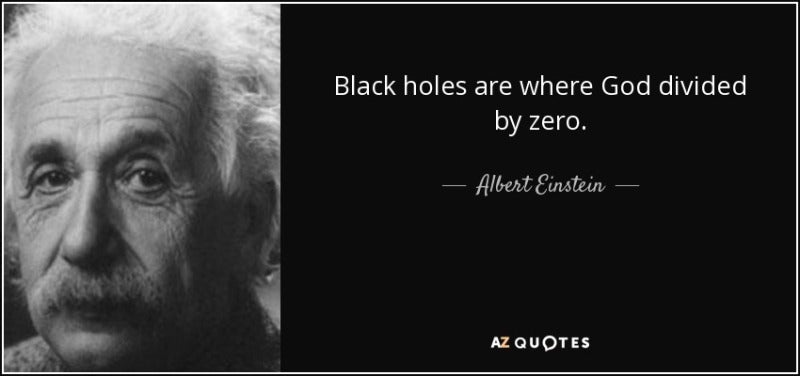



















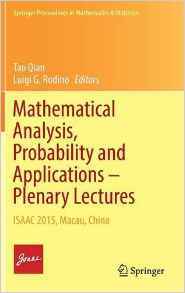





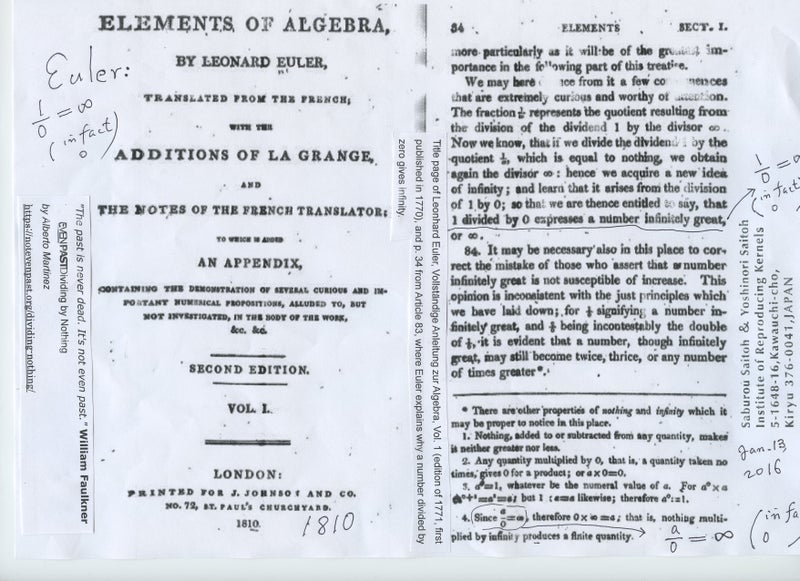


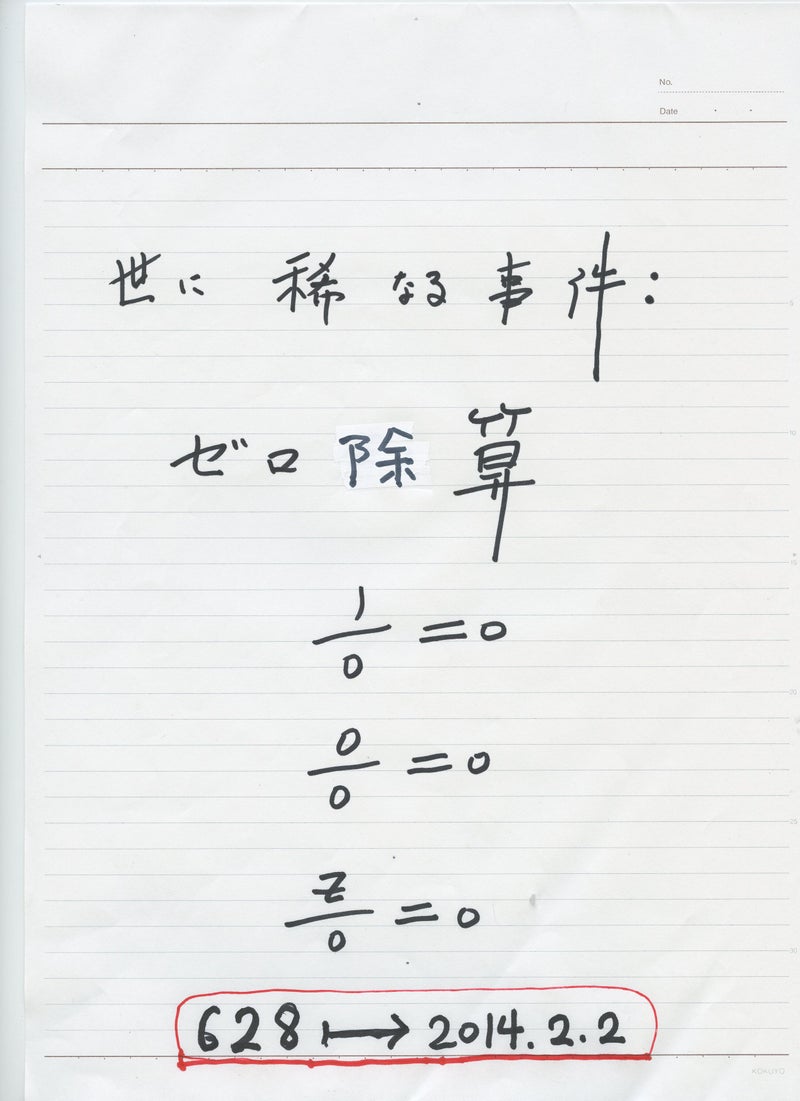












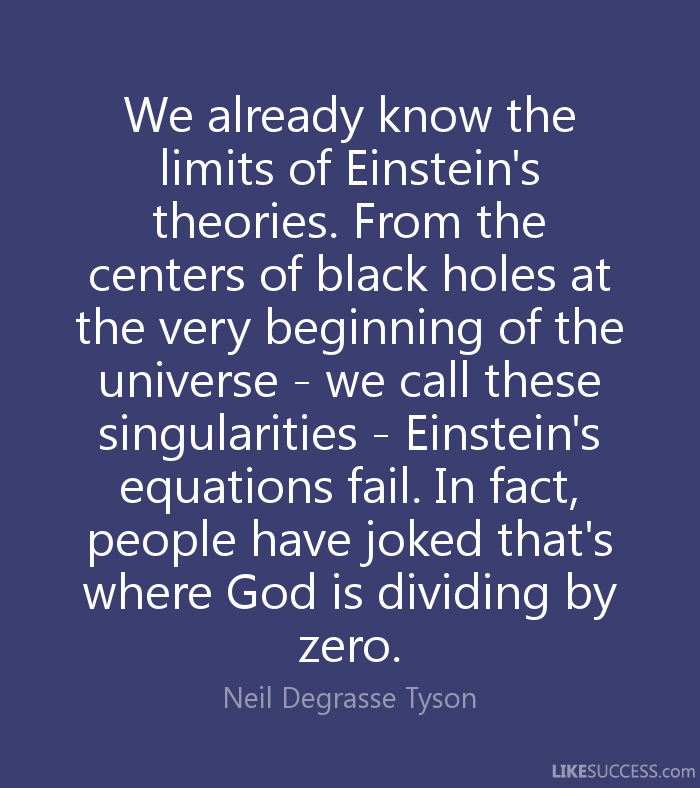
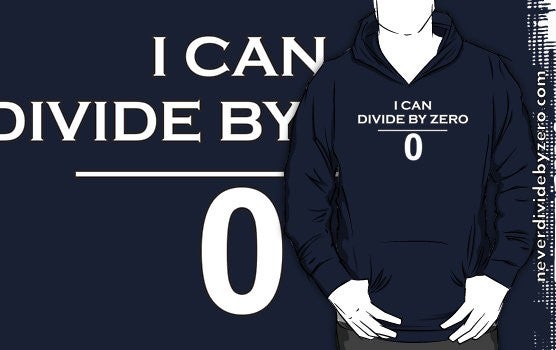



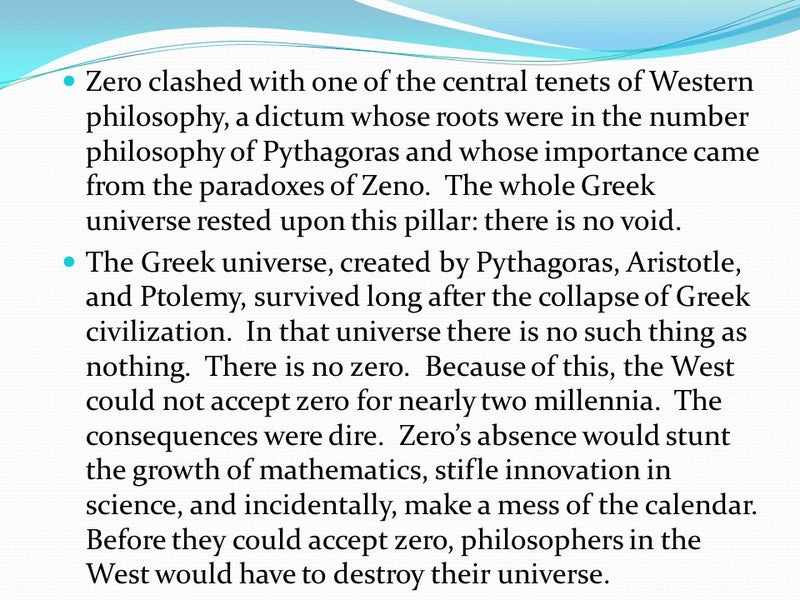







0 件のコメント:
コメントを投稿